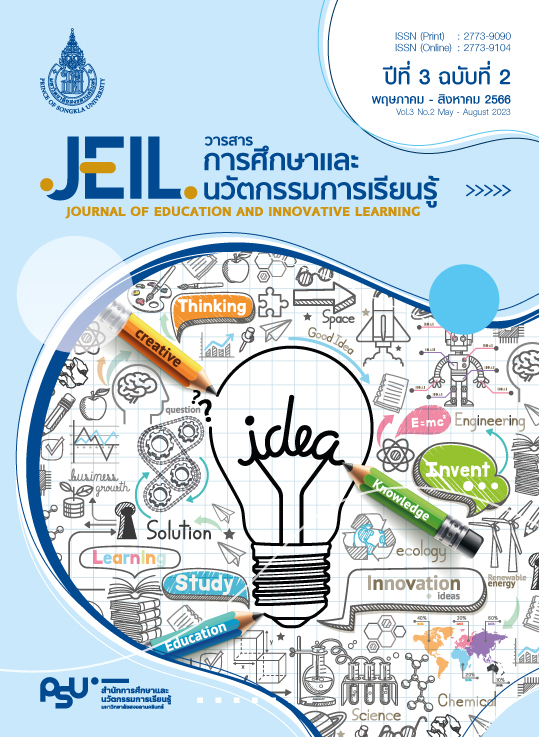การพัฒนาการจัดการเรียนรู้ออนไลน์โดยใช้การเรียนรู้แบบนำตนเองเพื่อส่งเสริมทักษะการสื่อสารภาษาอังกฤษสำหรับนักศึกษาครู
Main Article Content
บทคัดย่อ
การวิจัยครั้งนี้มีวัตถุประสงค์เพื่อ 1) พัฒนาและหาประสิทธิภาพการจัดการเรียนรู้ออนไลน์โดยใช้การเรียนรู้แบบนำตนเองตามเกณฑ์ 80/80 2) เปรียบเทียบผลการเรียนรู้ก่อนและหลังการจัดการเรียนรู้ออนไลน์โดยใช้การเรียนรู้แบบนำตนเอง และ 3) ศึกษาความพึงพอใจในการเรียนของนักศึกษาครู กลุ่มตัวอย่างคือ นักศึกษาครู ภาคเรียนที่ 2 ปีการศึกษา 2566 มหาวิทยาลัยราชภัฏกาญจนบุรี ตามความสมัครใจจำนวน 50 คน เครื่องมือที่ใช้วิจัยคือ แพลตฟอร์มการเรียนรู้ออนไลน์โดยใช้การเรียนรู้แบบนำตนเอง แบบทดสอบทักษะการสื่อสารภาษาอังกฤษ และแบบประเมินความพึงพอใจในการเรียน สถิติที่ใช้ในการวิจัย ได้แก่ ค่าเฉลี่ย ส่วนเบี่ยงเบนมาตรฐาน และการทดสอบค่าทีแบบไม่เป็นอิสระต่อกัน ผลการวิจัยพบว่า 1) การจัดการเรียนรู้ออนไลน์โดยใช้การเรียนรู้แบบนำตนเองเพื่อส่งเสริมทักษะการสื่อสารภาษาอังกฤษสำหรับนักศึกษาครูที่พัฒนาขึ้นมีประสิทธิภาพเท่ากับ 81.10/81.15 ซึ่งสอดคล้องกับเกณฑ์ 80/80 2) ทักษะการสื่อสารภาษาอังกฤษของนักศึกษาครูหลังการจัดการเรียนรู้ออนไลน์โดยใช้การเรียนรู้แบบนำตนเองสูงกว่าก่อนจัดอย่างมีนัยสำคัญทางสถิติที่ระดับ .01 และ 3) ความพึงพอใจในการเรียนของนักศึกษาครูโดยรวมอยู่ในระดับมากที่สุด
Article Details

อนุญาตภายใต้เงื่อนไข Creative Commons Attribution-NonCommercial-NoDerivatives 4.0 International License.
เนื้อหาและข้อมูลในบทความที่ตีพิมพ์ในวารสารการศึกษาและนวัตกรรมการเรียนรู้ ถือเป็นข้อคิดเห็นและความรับผิดชอบของผู้เขียน ซึ่งกองบรรณาธิการวารสาร ไม่จำเป็นต้องเห็นด้วยหรือร่วมรับผิดชอบใด ๆ และไม่สงวนสิทธิ์การคัดลอกบทความเพื่อใช้ประโยชน์ทางวิชาการ แต่ให้อ้างอิงข้อมูลแสดงที่มาของบทความทุกครั้งที่นำไปใช้ประโยชน์
เอกสารอ้างอิง
Al Kandari, A. M., & Al Qattan, M. M. (2020). E-task-based learning approach to enhancing 21st-century learning outcomes. International Journal of Instruction, 13(1), 551-566. doi:10.29333/iji.2020.13136a
Baron, D. (2020). The 13 must have features of learning management system. Retrieved from https://www.peoplefluent.com/blog/learning/13-must-have-features-of-a-learning-management-system
Daniel, B. (2018). eTraining. Retrieved from https://www.edapp.com/blog/etraining
E-trainingsystem. (2022). What is E-trainingsystem?. Retrieved from https://www.e-trainingsystem.com
Han, Z. (2018). Task-based learning in task-based teaching: training teachers of Chinese as a foreign language. Annual Review of Applied Linguistics, 38(1), 162-186. doi:10.1017/S026719051800003X
Herbert, P. G., & Sylvia, O. (2016). Piaget’s theory of intellectual development (3rd ed.). Washington: International Psychotherapy Institute.
Ismail, K. (2021). What is a learning management system. Retrieved from https://www.cmswire.com/digital-workplace/what-is-a-learning-management-system
Ministry of Higher Education, Science, Research and Innovation. (2021). Policy and Strategy of MHESI in 2020-2027. Bangkok: MHESI. [in Thai]
Nillapun, M., (2015). Research Methodology in Education. Nakorn Pathom: Silapakorn University. [in Thai]
Phetkham, S., & Sovajassatakul, T. (2022). A development of multimedia courseware using the self-directed learning on computer assembly for student at the second years vocational certificate level. Journal of Industrial Education, 21(3), 99-108. [in Thai]
Piaget, J. (2001). The Psychology of Intelligence. United Kingdom: Routledge.
Rajabalee, Y. B., & Santally, M. I. (2021). Learner satisfaction, engagement and performances in an online module: Implications for institutional e-learning policy. Education and Information Technologies, 26(3), 2623-2656. doi:10.1007/s10639-020-10375-1
Renaux, E., Caron, P. A., & Le Pallec, X. (2005). Learning management system component based design: a model driven approach. In The international multidisciplinary conference on e-technologies (MCETECH), Montreal, Canada
Weller, D. (2020). Task based language teaching – TBLT. Retrieved from https://studycat.com/webinar/task-based-language-teaching-tblt/
Willis, J. (1996). A framework for task-based learning. London: Longman Press.
Yunia, D. (2021). E-learning training activities for lecturers. MOVE: Journal of Community Service and Engagement, 1(1), 19-22.


